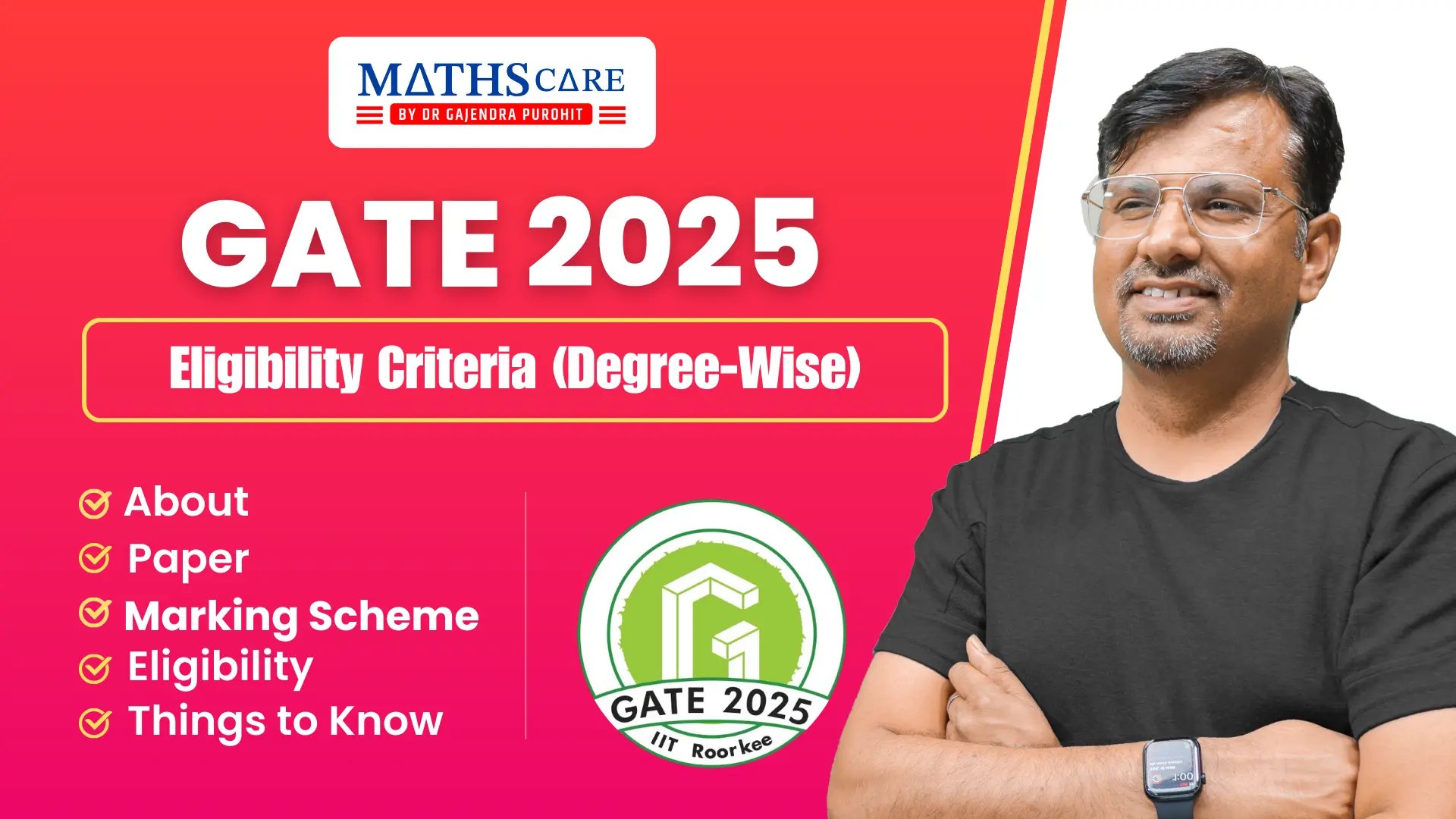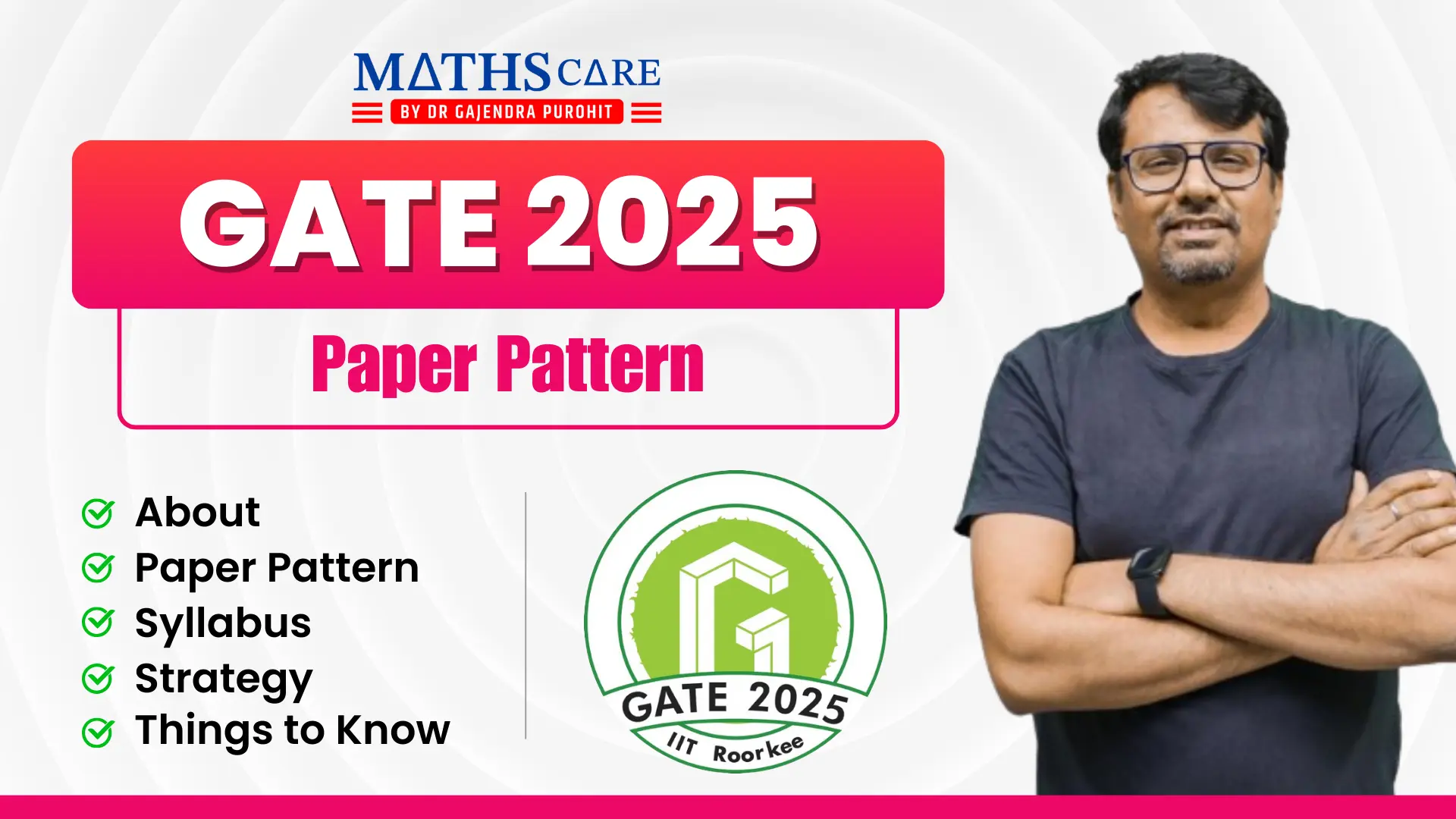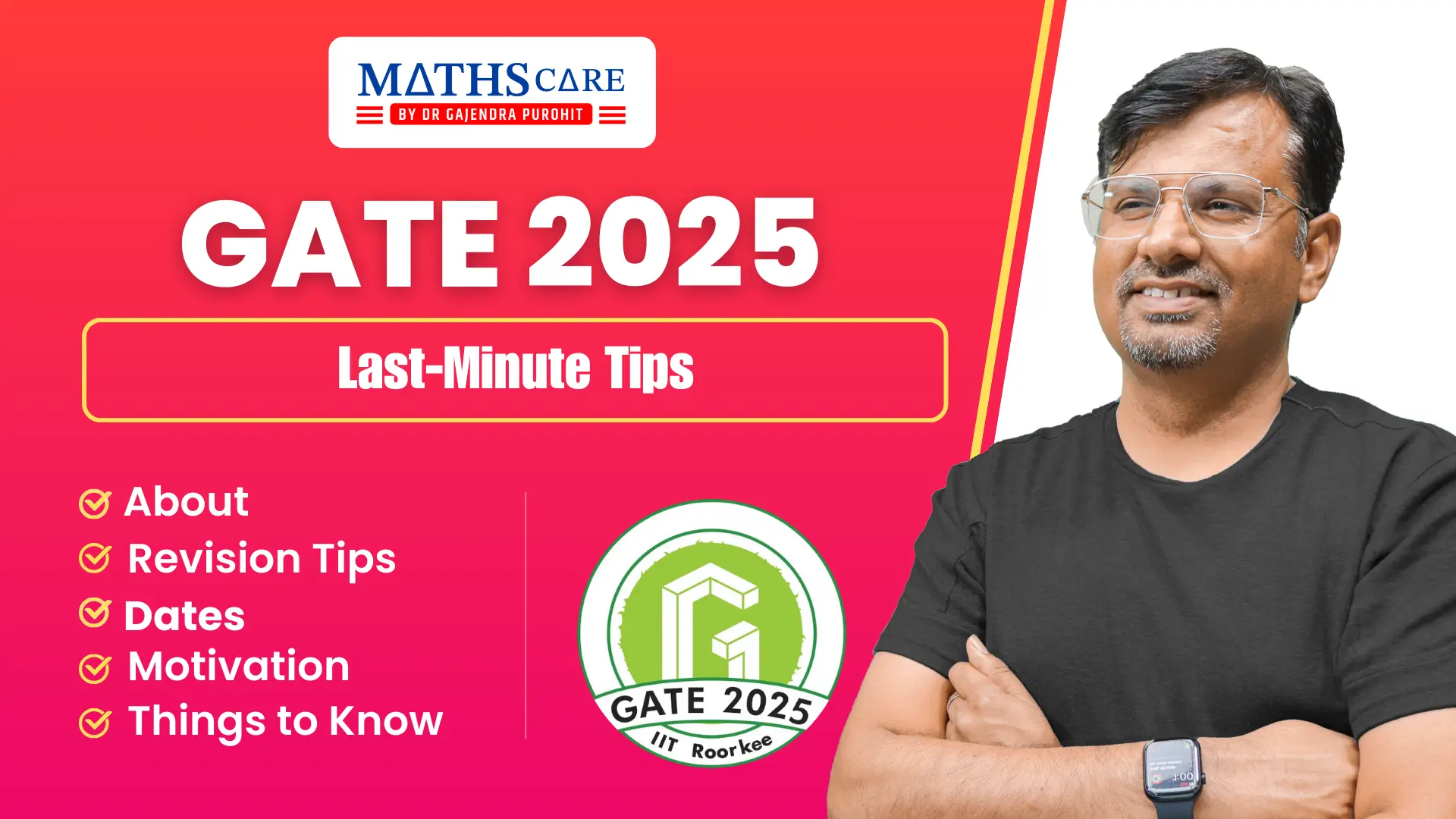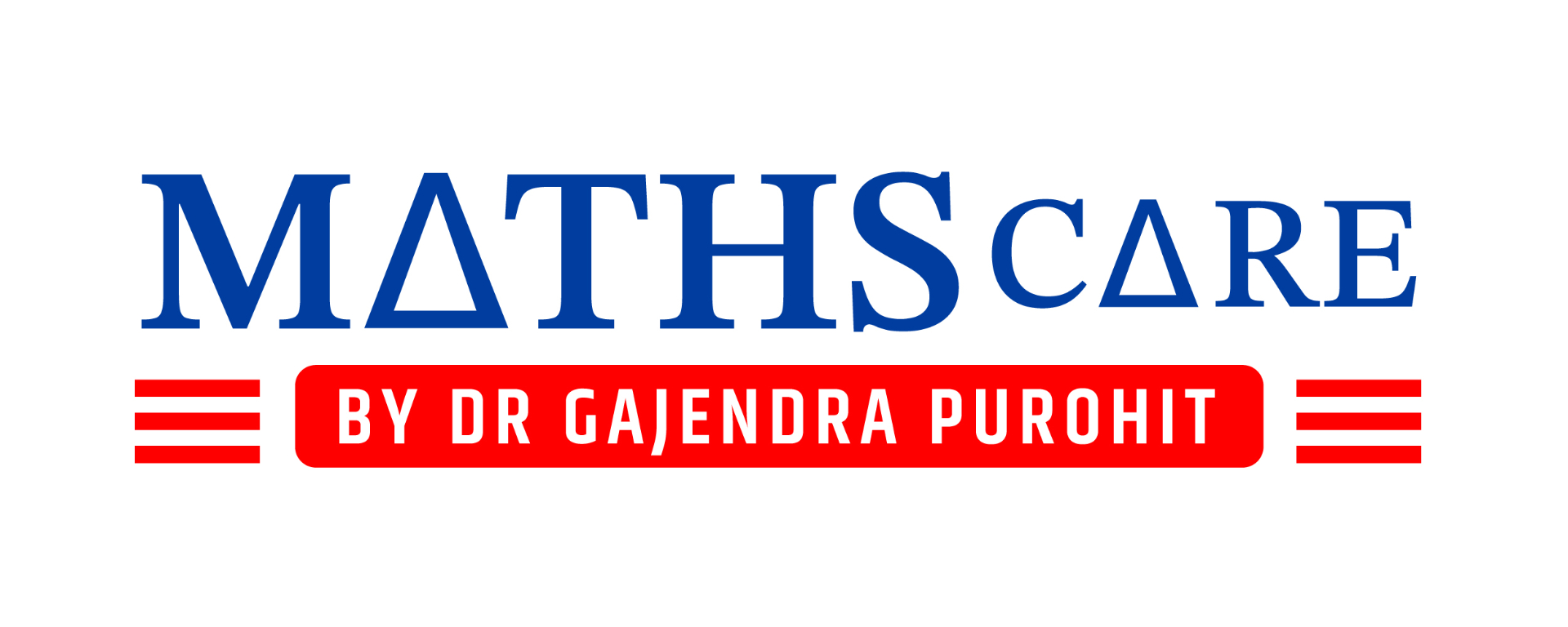GATE 2026 Information Brochure (Highlights)
GATE (Graduate Aptitude Test in Engineering): The Graduate Aptitude Test in Engineering (GATE) is a prestigious national-level examination that serves as a gateway for candidates aspiring to pursue higher education in engineering, technology, architecture, and science. Conducted jointly by the Indian Institute of Science (IISc) and the Indian Institutes of Technology (IITs), GATE is also a crucial benchmark for recruitment in Public Sector Undertakings (PSUs) and offers opportunities for scholarships and research fellowships.
With GATE 2026 approaching, understanding its eligibility criteria, paper pattern, marking scheme, and available courses is vital for aspirants. This blog provides comprehensive details regarding the exam to help students prepare efficiently and make informed decisions.
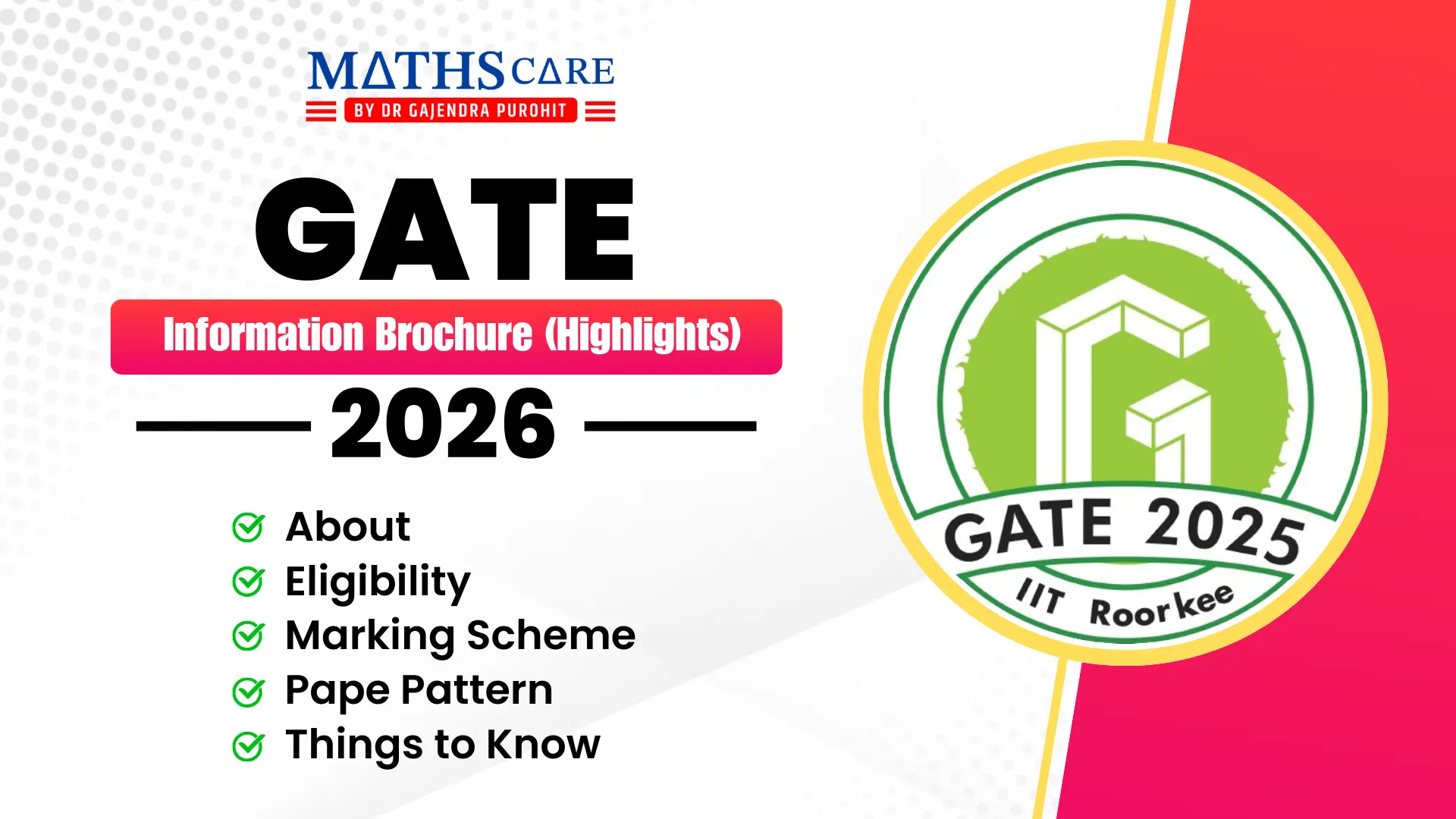
About GATE 2025
GATE is a national-level examination that evaluates a candidate’s understanding of core subjects in engineering, technology, and science. It is a highly competitive test that serves multiple purposes, including admissions to postgraduate programs, eligibility for research fellowships, and recruitment opportunities in Public Sector Undertakings (PSUs). Each year, lakhs of students appear for GATE, making it one of the most sought-after entrance exams in India.
GATE is conducted as an online Computer-Based Test (CBT) with a structured evaluation format. The exam consists of multiple papers covering 30 disciplines, allowing candidates to showcase their expertise in specialized fields. Scoring well in GATE not only facilitates admission to IITs, IISc, and NITs but also opens pathways to government and private sector job opportunities. Furthermore, GATE scores are valid for three years, giving candidates flexibility in planning their higher education or career moves. The exam continues to evolve each year, incorporating changes to better assess candidates’ analytical and problem-solving skills, making it a benchmark for excellence in technical and scientific education.
Key Highlights:
Organizing Institute: To be announced (IIT Roorkee conducted GATE 2025)
Mode of Examination: Online (CBT)
Duration: 3 hours
Total Papers: 30 subjects
Total Marks: 100
Question Types: Multiple Choice Questions (MCQs), Multiple Select Questions (MSQs), and Numerical Answer Type (NAT) questions.
Purpose: Admission to M.Tech, Ph.D. programs, PSU recruitment, and fellowship opportunities.
GATE 2026 Eligibility Criteria
To appear for GATE 2026, candidates must meet the following eligibility criteria:
Educational Qualification: Candidates must have completed or be in the final year of their Bachelor’s degree (B.E./B.Tech/B.Sc./B.Arch/B.Pharm) or Master’s degree (M.Sc./MCA/MA) in relevant disciplines.
Accepted Degrees: Engineering, Technology, Science, Architecture, and Humanities.
Age Limit: No age restriction.
Nationality: Open to Indian as well as foreign candidates.
GATE 2026 Paper Pattern
GATE 2026 will follow a structured pattern designed to test conceptual understanding and problem-solving skills:
Total Number of Questions: 65
Types of Questions:
MCQs (Multiple Choice Questions): Only one correct option out of four.
MSQs (Multiple Select Questions): One or more correct options.
NAT (Numerical Answer Type): Requires manual input of numerical answers.
Subjects Covered: Engineering, Sciences, and Humanities.
Sections:
General Aptitude (GA): 15 Marks
Engineering Mathematics (for some papers): 13 Marks
Subject-Specific Questions: 72 Marks
Exam Duration: 3 hours (180 minutes)
GATE 2026 Paper Combination Options
Candidates can opt to appear for one or two test papers, provided they follow the allowed combinations. The paper combinations ensure that aspirants can choose subjects that align with their academic background and future career goals. Below are the available paper combinations:
Aerospace Engineering (AE): Candidates selecting AE as their primary paper have the option to choose between Civil Engineering (CE), Mechanical Engineering (ME), or Engineering Sciences (XE) as their secondary paper. This combination is ideal for those looking to expand their expertise into overlapping engineering disciplines.
Civil Engineering (CE): Those opting for CE can pair it with Agricultural Engineering (AG), Architecture (AR), Earth Sciences (ES), Geomatics Engineering (GE), Naval Architecture & Marine Engineering (NM), or Engineering Sciences (XE). This combination is particularly beneficial for candidates interested in multidisciplinary applications of civil engineering.
Computer Science and Information Technology (CS): CS aspirants can select a secondary paper from Data Science and Artificial Intelligence (DA), Electronics and Communication Engineering (EC), Geomatics Engineering (GE), Mathematics (MA), Physics (PH), or Statistics (ST). This combination helps candidates explore diverse computational and analytical applications.
Electronics and Communication Engineering (EC): EC candidates can opt for a secondary paper in Computer Science (CS), Data Science and Artificial Intelligence (DA), Electrical Engineering (EE), Instrumentation Engineering (IN), or Physics (PH). This combination is useful for aspirants interested in telecommunications, embedded systems, and related domains.
Mathematics (MA): Those selecting MA as their primary paper can combine it with Computer Science (CS), Data Science and Artificial Intelligence (DA), Physics (PH), or Statistics (ST). This is a valuable combination for students aiming for careers in analytics, research, and computational sciences.
Mechanical Engineering (ME): ME aspirants can choose a secondary paper in Aerospace Engineering (AE), Data Science and Artificial Intelligence (DA), Instrumentation Engineering (IN), Naval Architecture & Marine Engineering (NM), Production & Industrial Engineering (PI), or Engineering Sciences (XE). This combination is particularly beneficial for candidates interested in interdisciplinary engineering fields.
Candidates should carefully evaluate their academic strengths and career aspirations before selecting their paper combinations. The choice of subjects should align with future study goals, job prospects, and areas of interest.
GATE 2026 Marking Scheme
Understanding the marking scheme is crucial for effective exam preparation:
Total Marks: 100
General Aptitude: 15 Marks (common for all papers)
Subject Questions: 85 Marks
Marking System:
MCQs: +1 or +2 marks per question, with negative marking (-1/3 for 1-mark questions, -2/3 for 2-mark questions).
MSQs: +2 marks per question, no negative marking.
NAT: +1 or +2 marks per question, no negative marking.
No Partial Marking: If multiple correct options exist in an MSQ, all must be selected for marks.
GATE 2026 Courses Offered
Clearing GATE 2026 allows candidates to pursue postgraduate courses in various disciplines:
Master of Technology (M.Tech) and Master of Engineering (M.E.)
Master of Science (M.Sc.) in select IITs and IISc.
Doctor of Philosophy (Ph.D.) programs.
Integrated M.Tech-Ph.D. programs
Postgraduate Diploma courses in select institutions
The offered courses depend on the institute and discipline chosen by the candidate.
GATE 2026 Admitting Institutes
GATE scores are accepted by IITs, IISc, NITs, IIITs, and other premier institutes across India. Some prominent admitting institutes include:
IISc Bangalore
IIT Bombay, IIT Delhi, IIT Kanpur, IIT Kharagpur, IIT Madras, IIT Roorkee
NITs (National Institutes of Technology)
IIITs (Indian Institutes of Information Technology)
Government-funded universities and research institutes
GATE 2026 Fellowship Opportunities
Candidates qualifying for GATE 2026 can avail themselves of numerous fellowship opportunities, including:
MHRD Scholarships: Monthly stipends for M.Tech and Ph.D. students in IITs and NITs.
Junior Research Fellowship (JRF): Offered by CSIR and DRDO for research-oriented programs.
Public Sector Undertakings (PSUs): Recruitment in ONGC, NTPC, BHEL, IOCL, GAIL, HPCL, DRDO, etc.
Foreign Universities: Certain international institutions provide research fellowships based on GATE scores.
Conclusion
GATE 2026 is an essential examination for students aiming for higher studies, research, and employment in engineering and science-related fields. With a structured syllabus, well-defined paper pattern, and numerous opportunities for postgraduate education and jobs, GATE remains one of the most sought-after competitive exams in India.
GATE FAQS
Upload the side of your ID showing your photo, name, date of birth, and ID number.
No, GATE application fees are non-refundable.
It depends on seat availability in your requested city. There’s no guarantee.
No, your application will be marked defective, and you will be asked to correct it.
Yes, you can add a second paper during the correction window, with an additional fee.
BEST OFFERING COURSES FOR YOU
BEST BOOKS FOR IIT JAM/ CSIR-NET
BUY BOOKS ON OUR APP
RECENT POSTS





